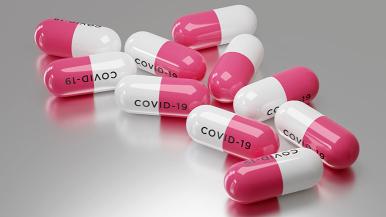Imagine being able to go to your local pharmacy and pick up a bottle of pills to treat COVID-19 that would have you feeling better in days. Soon, that could be the reality because the U.S. Food and Drug Administration is reviewing two antiviral pills, one from Pfizer and one from Merck, for COVID-19.
We asked Erin Shaughnessy, PharmD, director of inpatient pharmacy at Rush University Medical Center, to explain how these drugs work and how they could change the course of the pandemic.
How does the Pfizer pill fight COVID-19?
Pfizer recently asked the FDA for an emergency use authorization, or EUA, of its drug, which will be sold under the name Paxlovid, to treat people with mild to moderate COVID-19 who are at high risk for hospitalization or death. Paxlovid is a type of drug called a protease inhibitor that blocks the activity of an enzyme that the coronavirus needs to replicate.
If authorized, patients would take two Paxlovid pills twice daily for five days along with another oral drug whose generic name is ritonavir. Ritonavir helps Paxlovid remain active in the body for longer periods of time so that it can slow down the virus’ ability to replicate.
According to Pfizer, if Paxlovid and ritonavir are taken within three days of the first sign of COVID-19 symptoms, studies show the risk of hospitalization or death drops by 89% in high-risk patients.
How does the Merck pill treat COVID-19?
Another drug company, Merck, has asked the FDA for an EUA of its pill, which has the chemical name molnupiravir, for treating COVID-19. Molnupiravir is a type of drug called a nucleoside analogue. It prevents the coronavirus from replicating by introducing “copying errors” into the virus’ RNA during the replication process.
If authorized, patients with COVID-19 would take eight molnupiravir pills a day for five days.
According to Merck, if molnupiravir is taken within five days of the start of symptoms, studies show the risk of hospitalization is cut by 30%.
What side effects do the COVID-19 pills have?
Among patients who took Pfizer’s Paxlovid, nearly one in five had mild side effects, although the specifics have not yet been released. Ritonavir, the drug that would be taken with Paxlovid, may cause side effects such as diarrhea, nausea, vomiting, abdominal pain, fatigue and dizziness.
For the Merck pill, no serious side effects have been published yet.
If approved, how would the COVID-19 pills be used at Rush?
If approved, these treatments could be prescribed for non-hospitalized patients with mild to moderate COVID-19. The COVID-19 pills would be used in much the same way as Tamiflu, a pill to treat the flu. Once patients have a confirmed case of COVID-19, their physicians could write a prescription for one of the pills, which they could pick up at a local pharmacy.
What kind of impact could the COVID-19 pills have on the pandemic?
Both drugs have the potential to keep people out of the hospital and help them avoid serious illness. The treatments could also help reduce the number of days that a person has COVID-19 symptoms and hopefully minimize the disruption to their lives.
The pills would also make it much easier for people with mild to moderate COVID-19 to access treatment. Currently, the only COVID-19 treatments available for mild to moderate COVID are outpatient infusions or injections.
While these pills could have a significant impact on the pandemic, it is important to remember that these drugs won’t prevent COVID-19 infections. Even after these new treatments become available, unvaccinated people should still get vaccinated to reduce their risk of infection and of spreading the virus to others. And all vaccinated adults should get their boosters, according to the latest CDC guidance.
If you have not yet received a COVID-19 vaccine or would like to get a booster, you can schedule an appointment to receive one now at our vaccine clinics.




